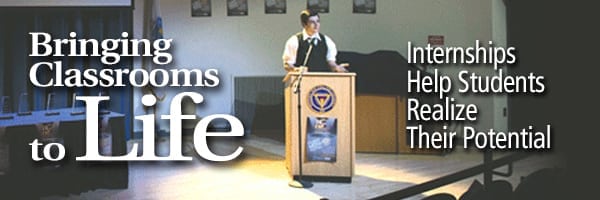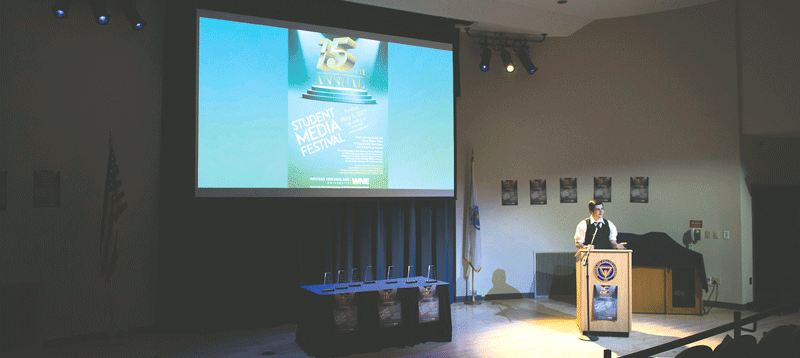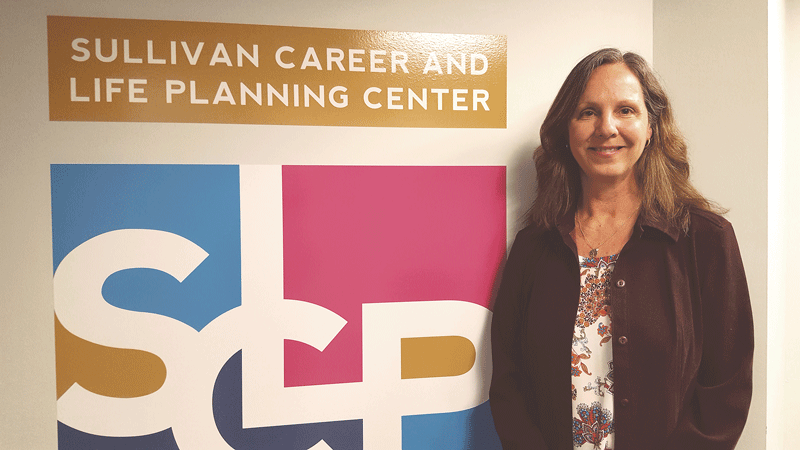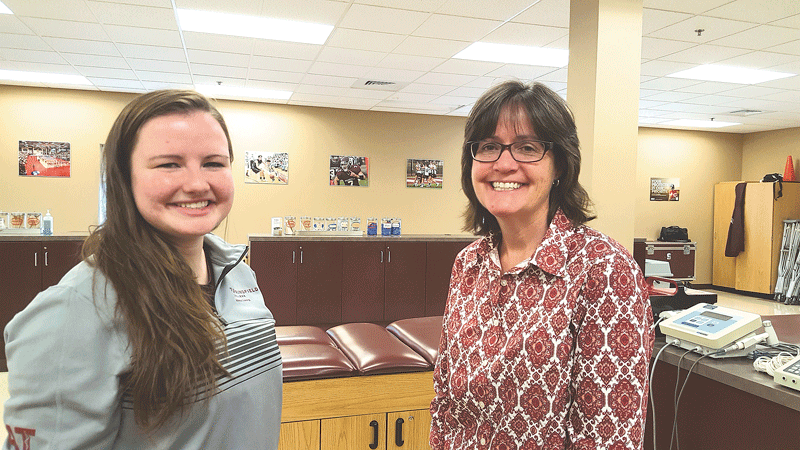
Internships Help Students Realize Their Potential
Bringing Classrooms to Life
By Alta J. Stark

Steven O’Brien emceed Western New England University’s Student Media Festival, part of his spring internship as chair of the festival.
Today’s college graduates understand it takes much more than book learning to compete in the job market; employers are looking for real-world experience. Students gain that experience through internships in their field, but they gain more than that. BusinessWest spoke with a few from this year’s graduating class who said their internships gave them confidence, inspiration, connections, and, in one case, a whole new career focus.
As thousands of new graduates from the region’s colleges and universities prepare to start their careers in a competitive labor market, the range of their majors is as varied as their diverse backgrounds and talents. But they’re finding it often takes more than a degree to prepare for the work world.
Increasingly, who gets the plum jobs comes down to the work experience students accrue well before they graduate.
“As students transition out of the university into the real world, employers are looking for students with experience,” said Andrea St. James, director of the Career Development Center at Western New England University. “College internships are now a major component in providing students with on-the-job skill sets they need to succeed. We encourage students to get that experience early and often.”
All colleges boast active career centers that help cultivate meaningful and practical experiences for students, but a unique consortium of career-center professionals is bringing it all together in the Pioneer Valley. Comprised of career directors from American International College, Bay Path University, Elms College, Holyoke Community College, Springfield College, Springfield Technical Community College, Western New England University, and Westfield State University, College Career Centers of Western Mass (CCCWM) provides companies and organizations a central venue in which to connect with a pool of potential interns and entry-level candidates located in Western Mass.
“We meet monthly to learn from each other. We want to help students not only build their résumés, but help direct where they may want to take their education when they leave,” said St. James.
CCCWM cross-posts job and internship opportunities, participates in career fairs throughout the year, and educates and empowers students through special events and focus groups, she added. “It’s a great resource to add to the specialized career preparation that’s available to students in their schools’ career centers. We encourage students to start exploring opportunities in their first year because an effective combination of education and career programs is a valuable complement to the academic experience.”

Laurie Cirillo says her department at Bay Path empowers women to take charge of their own career path.
In addition, career counselors help internship-seeking students make and maintain connections with friends, peers, professors, and alumni who may be helpful in their search. To hear the students tell it, those efforts are paying off.
The Right Channels
As a communications major at Western New England University, Steven O’Brien is learning how to tell stories creatively and effectively. He’s an incoming senior who’s spent the past three years studying mass media, television, radio, online media, and media production. This past spring, he jumped at the chance to turn his academic learning into real-life, hands-on experience.
“Ask anybody who has anything remotely to do with finding a job after college — anybody from the career development center, any of my professors — and they’ll tell you internships are critical because more and more employers, even for entry-level positions, are looking for people who have experience in the field,” he said.
O’Brien chaired WNEU’s 15th annual Student Media Festival, which celebrates student-produced music videos, news reports, newspaper articles, radio programming, commercials, public-service announcements, and digital photography.
“The Media Festival is a huge part of the spring semester for everyone who enters WNE. My focus was to make this the best it could be and do my job well because a lot of people were counting on me to do that,” he said.
SEE: List of Colleges in Western Mass.
He worked closely with Professor Brenda Garton-Sjoberg, who told BusinessWest that internships place students in the driver’s seat to navigate through career options, as well as providing outstanding networking opportunities.
“They allow students to experience a job through academic credit to determine if that’s the best path for their future down the road,” she explained. “I believe internships are essential for anyone, especially students interested in careers in communications.”
Simply put, O’Brien added, “being in the internship environment forces you to either sink or swim. It puts you in a position that, if you don’t have these skills, you have to find them quickly. If you’re not familiar with something, you need to know about it, and you need to learn about it.”
We encourage students to start exploring opportunities in their first year because an effective combination of education and career programs is a valuable complement to the academic experience.”
What O’Brien liked best about the internship was wearing many hats. “It was really a multi-faceted internship that went beyond the norm. It dealt with myriad skills and disciplines from public speaking and PR to marketing, media production, event planning, social-media marketing, and e-mail marketing. To get a taste of each of those, I think, was incredible.”
St. James agreed. “It’s the soft skills that he’s building that all employers value; yes, it’s the networking, the résumé building, but knowing how to manage personalities, the critical thinking, the teamwork, the motivation, communication, the small talk that has to occur to bring this people together — that’s really invaluable.”
O’Brien aced the internship in more ways than his grade. He also networked himself into a paid summer internship with the festival’s media sponsor, Cloud 9 Marketing Group, a fairly new startup founded by a recent WNE graduate.
“I worked with him throughout the entire process, and got to know him,” he said. “After the festival, I e-mailed him to ask if he was looking for interns this summer. We met, and now it looks like I’ll have an internship this summer that grew from my spring internship.”
Gaining Empowerment
Alison Hudson has been performing since she was 3 years old. She says she’s always known she wanted a career that would include her love of the creative arts and her passion for psychology. She graduated from Bay Path University in May, majoring in forensic psychology, with a minor in performing arts. In the fall, she’s going to Lesley University to seek a master’s degree in mental health counseling with a focus on drama therapy.
Hudson said her senior-year internship was critical because it showed her she was on the right path for her future. Specifically, she interned as a residential assistant at Berkshire Hills Music Academy, a live-in community for young adults with developmental disabilities, who gain communication skills through music therapy.
“The students are really wonderful,” she said. “They welcome you into their lives, and it’s very rewarding.”

Tori Bouchard, certified trainer and 2017 Springfield College graduate (left), with Sue Guyer, chair of Exercise Science and Sport Studies at the college.
Prior to her internship, Hudson wanted to work with veterans and rehabilitated criminals, but her work at the academy pointed her in a different direction. “This internship gave me the confidence to take on the challenge of grad school and follow a career path of working with people using performing arts as therapy,” she said.
In fact, helping students build confidence helps them graduate, move on to graduate school, and get a job, said Laurie Cirillo, assistant dean of Student Success at Bay Path’s Sullivan Career & Life Planning Center. “We’re trying to empower women to be in power over their own destiny.”
To help students grow and develop self-reliance, Bay Path has adopted a unique take on the internship experience, which has become a hallmark of the university. “We don’t place our students; they work with a career coach to match themselves,” Cirillo said. “We provide a solid support system and strategies for success, but we’ve found multiple benefits to having students open the doors to the next steps of their lives and careers.”
When Delmarina Lopez entered Bay Path as a freshman, she didn’t think she could do that. The young Latina woman with a love for the public sector recalls that she was ready to transfer out.
“College was a rude awakening for me, academically, culturally, and financially, but President [Carol] Leary wasn’t going to let me go. I received amazing support, guidance, and mentoring. I stayed, and I do not regret it.”
Lopez, who’d already achieved success in her young life as the first high-school-age, community-based intern for former Gov. Deval Patrick, became more active on campus, serving as Leary’s presidential ambassador, as well as president of the Student Government Assoc. She started as a criminal justice major, then switched to legal studies after interning with attorney Elizabeth Rodriguez-Ross of Springfield.
“I knew her as one of a handful of Latina leaders in our community. It was good to work with someone who looked like me and has a similar background,” Lopez said. “She taught me the importance of mentoring and bringing someone up with you, not just focusing on yourself. I learned that law isn’t about competition; it’s about justice.”
Lopez applied to multiple law schools across the country and was accepted at 12; she chose to stay close to home, entering Western New England University Law School this fall on a full scholarship.
Cirillo says helping build a woman’s self-efficacy is one of the most rewarding parts of her job. “Many students come here with a lot of self-doubt, but by the end of their college experience, they’re able to stand back and see what they’ve achieved, and what lies ahead as they realize their potential.”
Trainers in Training
Springfield College is well-known for its athletic programs. “We’re preparing students for careers in the fitness and health industry, providing them with classroom and hands-on training from day one,” said Sue Guyer, chair of the school’s Exercise Science and Sport Studies program. “Undergrads and grads work with varying populations, from top-level athletes to still-developing high-school athletes and the elderly, and they’re influencing their lives for the better.”
Tori Bouchard completed six internships during her studies to become a certified athletic trainer. It’s a program requirement to complete a clinical rotation each semester, starting sophomore year.
“Through these rotations, we’re able to connect to patients, coaches, other athletic trainers, and other healthcare professionals, and athletic directors. We’re able to grow as athletic trainers,” Bouchard said. “We’re able to see and meet all sorts of different people. No case is the same. No patient is the same patient. So you take the theories you’re learning in the classroom, and you apply them to the setting, and not everything is always textbook. Nothing is ever textbook, actually. So, sometimes you’re learning one thing, but you realize — under supervision of the preceptor — ‘oh, this isn’t necessarily going to work for this case, but I also know about this technique.’”
Guyer said it’s impossible to measure the true value of the experiential learning. “It’s invaluable to have the opportunity to mentor into the profession,” she told BusinessWest, noting that the rotations can also have a positive impact at understaffed schools, which may have large populations of student athletes, but just one athletic trainer on staff.
“If Springfield College sends two interns to that high school, they’ve added two qualified people to help maintain the health and well-being of students,” she went on. “What we’ve learned is, if a student is able to see, feel, experience, treat, and rehabilitate athletes, that it really brings the classroom to life.”
Bouchard agreed. “The connections with people are unbelievable,” she said.
“You learn so much just by talking to other people, learning what they’ve learned, and you grow as a person.”
Bouchard has passed her certification exam and is presently looking for a paid internship before heading back to graduate school. “I think I still have more to learn in the clinic,” she said. “I think you’re always learning something new, and I want to learn who I really am when I’m working on my own team without another athletic trainer.”
That is, after all, what the college experience is really about — young people learning who they are, what they can do, and how to realize their potential.




